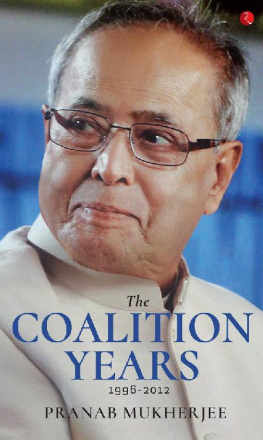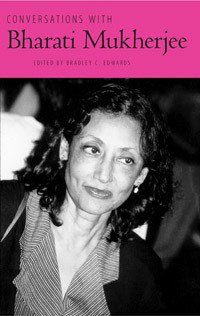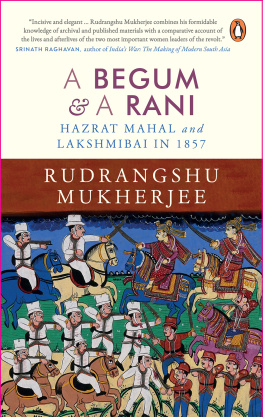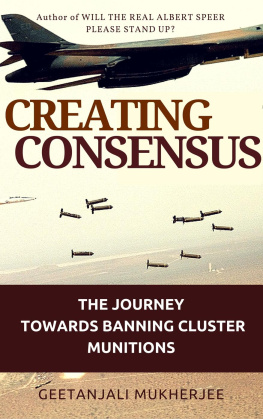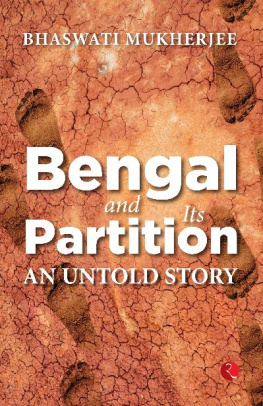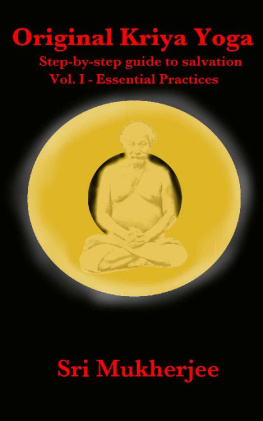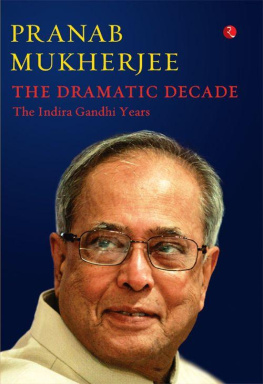The
COALITION
YEARS
19962012
Other books by the author
Beyond Survival: Emerging Dimensions of Indian Economy (1984)
Off the Track (1987)
Saga of Struggle and Sacrifice (1992)
Challenges Before the Nation (1992)
Thoughts and Reflections (2014)
The Dramatic Decade: The Indira Gandhi Years (2014)
The Turbulent Years (2016)
First published by
Rupa Publications India Pvt. Ltd 2017
7/16, Ansari Road, Daryaganj
New Delhi 110002
Copyright Pranab Mukherjee 2017
Photos courtesy:
Anandabazar Patrika Archive:
Hindustan Times :
Photo Division:
Author Archives:
The views and opinions expressed in this book are the authors own and the facts are as reported by him which have been verified to the extent possible, and the publishers are not in any way liable for the same.
All rights reserved.
No part of this publication may be reproduced, transmitted, or stored in a retrieval system, in any form or by any means, electronic, mechanical, photocopying, recording or otherwise, without the prior permission of the publisher.
ISBN: 978-81-291-4905-3
First impression 2017
10 9 8 7 6 5 4 3 2 1
The moral right of the author has been asserted.
This book is sold subject to the condition that it shall not, by way of trade or otherwise, be lent, resold, hired out, or otherwise circulated, without the publishers prior consent, in any form of binding or cover other than that in which it is published.
Dedicated to
the Indian Voter
CONTENTS
PREFACE
My journey of 37 years as a parliamentarian came to an end in July 2012 when I was elected the President of India. However, I continued to have a tenacious link with this revered institution; in fact, I became an integral part of it as the President of the Republic.
Five years later, on 25 July 2017, my association with the Parliament came to an end when I demitted the highest office of the country. After 48 action-packed years, I left this hallowed institution with a tinge of sadness and a rainbow of memories. I left with a sense of fulfilment and happiness at having served the people of this great country through this institution. How successful I was in discharging my responsibilities will be judged, over time, by the critical lens of history.
Today, I am no longer the president but a citizen, a pilgrim just like you in Indias march towards glory. As I reflect on my political journey, I feel privileged to have witnessed and participated in the emergence of a great nation. I learnt from my travels across the length and breadth of the country and my conversations with people across the social spectrumstudents, scientists, innovators, scholars, jurists, authors, artistes and leaders from all over the world. I intend to continue this journey of learning in the years to come.
The Coalition Years is third in the trilogy titled Dramatic Decades , beginning with The Indira Gandhi Years 19691980 and followed by The Turbulent Years 19801996 , which chronicle my life as a parliamentarian from 1969 to 1996. This volume is a recollection of my experiences from 19962012the triumphs and tribulations that characterized post-Congress polity and the fascinating encounters with leaders across the political divide. Whether it was the creation of a streamlined defence procurement procedure, the successful conclusion of the IndoUS nuclear deal, or the establishment of a social security net through landmark legislations like MGNREGA, and the introduction of Aadhaar, as Cabinet Minister heading the ministries of Defence, External Affairs and Finance, I had the opportunity to preside over agendas that formed the cornerstone of Congress policies for the making of an inclusive India.
The process of writing this book has been stimulating as well as illuminating. I offer The Coalition Years to you, dear reader, in the hope that you will gain new insight into the behind-the-scenes action in the areas of decision-making, policy formulation and its implementation in the government.
I hope you will enjoy reading the book as much as I have enjoyed writing it.
Pranab Mukherjee
New Delhi, October 2017
CHAPTER 1
IN PARLIAMENT
M y journey as a parliamentarian began decades ago when I became a member of the Congress Parliamentary Party (CPP), when the Bangla Congress merged with the Indian National Congress (INC) towards the end of 1971. Before that I was an independent Member representing Bangla Congressa regional partyfrom 1969 to 1971. I was a member of the Rajya Sabha for five terms till 2004 when I was elected to the Lok Sabha. There was, however, a short period1987 to 1993when I was out of the Parliament. And from 1987 to 1988, I was out of the Congress too, virtually on a sabbatical from politics.
That break notwithstanding, my long career has been enriching and has shaped my political outlook and persona. I entered the Parliament at a time when the Rajya Sabha was full of experienced parliamentarians and leaders of the freedom movement, many of whom were brilliant speakers such as M.C. Chagla, Ajit Prasad Jain, Jairamdas Daulatram, Bhupesh Gupta, Joachim Alva, Mahavir Tyagi, Raj Narain, Bhai Mahavir, Dahyabhai Patel and Maniben Patel (Sardar Vallabhbhai Patels son and daughter respectively) and Loknath Misra.
Bhupesh Gupta, a leader of the Communist Party of India (CPI), was truly a legend in the Rajya Sabha and left an indelible impression on me. He was in a way my mentor in the Parliament. It is not as if I did not have any differences with him. I would like to recount one particular incident that highlights his graciousness and civility in the Parliament.
In 1980, when I was the minister in charge of Commerce, Textiles, Steel and Mines and Civil Supplies, the President, in 1979, had issued an ordinance sanctioning preventive detention to maintain essential supplies. This was opposed by the Opposition parties including the Left under Bhupesh Guptas leadership. A debate on this issue continued in the Rajya Sabha till late at night. As the minister in charge, and in accordance with the custom, I enquired of the members about the time they would like to be served dinner. No sooner had I asked, than Gupta rose and said aggressively, We will have a sumptuous meal at your expense and inflict on you a crushing defeat. I was taken aback and retorted, Neither you nor I am the master of the House. Do not arrogate to yourself the position of the spokesperson of the House.
Ms Indira Gandhi, who was seated beside me, thought that I had exceeded my brief and said, You have been unnecessarily rude to Gupta. I also realized my mistake and immediately sent a note to Gupta expressing regret. He nodded with a gracious smile and the matter was put to rest.
Gupta began his career in the Parliament in 1952 when the House was constituted and continued to be its member till 1981, when he passed away while undergoing treatment in Moscow. I still remember the glowing tributes paid to him across the political spectrum. Prime Minister Indira Gandhi had said that the Rajya Sabha would not be the same without him.
My career as a parliamentarian was mentored by Ms Indira Gandhi. Her steely determination, clarity of thought and decisive actions made her a towering personality. She never hesitated to call a spade a spade. I remember we had gone to London in November 1978, after the defeat of the Congress in the post-Emergency elections in 1977. A large number of media persons in a fairly aggressive mood were waiting for Ms Gandhi at the Heathrow Airport lounge. The first question that was flung at her was, What have been your gains from the Emergency? Looking the journalist squarely in the eye, she replied in a level voice, In those 21 months, we comprehensively managed to alienate all sections of the Indian people. A moment of silence followed by loud laughter! Not one question was asked after that and the media persons just melted away. I also learnt an early lesson of acknowledging mistakes and rectifying them. Self-correction in such situations is always a better option than self-justification.



